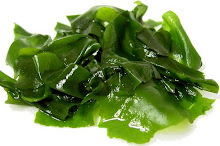
I was privileged to talk with Dr. Cecilia Hart, a great Natural Doctor (ND) in Berkeley today to get her perspective on sea vegetables. I feel like getting a range of medical opinions on eating sea vegetables is helpful to myself and (hopefully) others. Here's a transcript of our talk.
Q: Who do you recommend eat sea vegetables?
A: Everyone, but the thing with sea weed and digesting it is you have to start with a small amount. So usually titrate the doses. It takes your body awhile to produce the enzymes to break it down. This is similar to when vegetarians start eating meat again and need to start slowly. So start with a small amount and then increase the doses. Sea weed contains a lot of iodine which is particularly helpful with certain breast disorders, overall breast health, and thyroid health.
Q: What exactly does eating sea vegetables do for the thyroid?
A: Iodine is a key factor in the conversion of the less active form of the thyroid hormone to the more active form. If you don't have enough iodine, you can't make that conversion very well.
Q: Can you talk a little about iodine in terms of hypothyroid conditions?
A: There are many reasons why someone would have hypothyroid disorders. One of the reasons could be an iodine deficiency because its needed for that conversion.
Q: How much would you recommend someone with a history of hypothyroidism eat sea vegetables?
A: It would really depend on what the numbers are from the labs that test for thryoid levels.
Q: Do sea vegetables have more nutrients in them than land vegetables?
A: They have more iodine and are pretty highly dense in protein compared to other green vegetables. They are also dense in calcium, iron, etc. They contain 10-20% protein which is pretty dense. Nori has 50% protein, which is pretty amazing. They have good eye antioxidants (luteins) for eye health. Eating sea weed helps with detoxification and helps to bind heavy metals.
Q: Hijiki has been found to contain a high level of inorganic arsenic. Does the body absorbs this? Do you recommend that people eat hijiki?
A: If we know that it is high in inorganic arsenic, we should NOT eat it.
Q: What do you suggest in terms of "organic" vs non organic certified sea vegetables?
A: I don't really understand the certification, but I would definitely try to avoid consuming heavy metals.
Q: Do you recommend that people eat them whole in soups vs. a supplement or tincture?
A: Cooking is always better, but its not always realistic for some people, so that's why we have the tinctures and supplements.
Q: Are there any people that you would recommend NOT eating sea vegetables?
A: Certain people who have too much iodine already like in hyperthyroid situations.

